Overview
Automated title commitment generation tools significantly enhance efficiency in property ownership research by streamlining data extraction and analysis. This automation not only reduces manual workloads but also minimizes processing times, which is crucial in today’s fast-paced real estate environment. Furthermore, these tools leverage advanced technologies, such as machine learning, to facilitate faster and more accurate document generation. This innovation effectively addresses common challenges faced within the real estate industry, underscoring the necessity of adopting such solutions for improved operational efficiency.
Introduction
The real estate industry is experiencing a transformative shift, with automated title commitment generation tools emerging as essential assets in streamlining property research processes. By leveraging cutting-edge technologies such as machine learning, these tools not only enhance efficiency but also significantly mitigate human error. This advancement enables professionals to concentrate on higher-value tasks that demand their expertise.
However, with a multitude of options available, navigating the complexities of selecting the right tool to meet specific operational needs, while addressing potential limitations, can be challenging.
This article offers a comparative analysis of leading automated title commitment generation tools, illuminating their features, benefits, and challenges to empower real estate professionals in making informed decisions.
Overview of Automated Title Commitment Generation Tools
The effectiveness and precision of the research process associated with are significantly enhanced by . By leveraging advanced technologies such as and , these systems from document titles. This , facilitated by automated title commitment generation tools, not only reduces manual workloads but also empowers professionals to generate agreements more swiftly and with fewer errors.
For example, platforms like Qualia, First American Title's TitleSmart, and Mainspring Services' titleLOOK stand out as , each providing distinct features tailored to the specific requirements of .
As the industry continues to evolve, automated title commitment generation tools are becoming increasingly vital to the document investigation workflow, effectively addressing common challenges such as . In 2025, the market share of automated document generation systems is projected to grow significantly, driven by the escalating demand for efficiency in property analysis.
Industry leaders emphasize that the integration of machine learning not only streamlines processes but also , paving the way for a more robust and responsive insurance market.
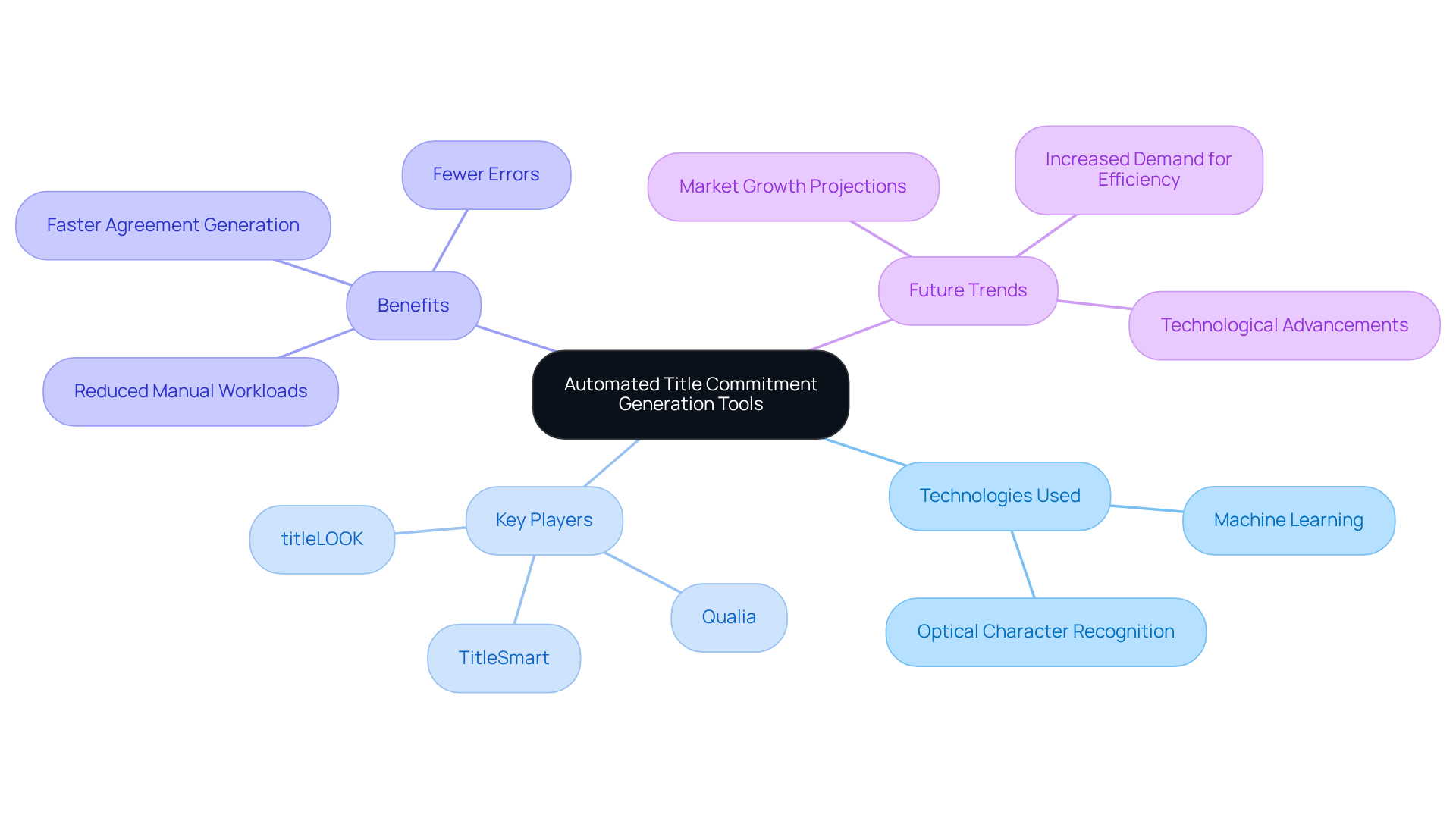
Key Features of Leading Tools
Leading play a pivotal role in . For instance, Qualia provides a comprehensive platform that integrates property documentation with escrow processes, facilitating seamless collaboration among stakeholders.
First American Title's TitleSmart excels in , delivering outcomes in as few as 60 seconds, significantly accelerating the closing procedure.
Furthermore, 'Mainspring Services' titleLOOK incorporates advanced features for automated document review and knowledge curation, allowing agents to pinpoint specific sections of commitments and forward requests to curative and underwriting resources, thus with clients.
In addition, with land service professionals to perpetually , ensuring users benefit from the .
The unique characteristics of automated title commitment generation tools address various aspects of the , underscoring the importance for users to assess their specific needs when selecting a solution.
Moreover, Parse AI offers compared to traditional , further increasing its appeal to real estate professionals.
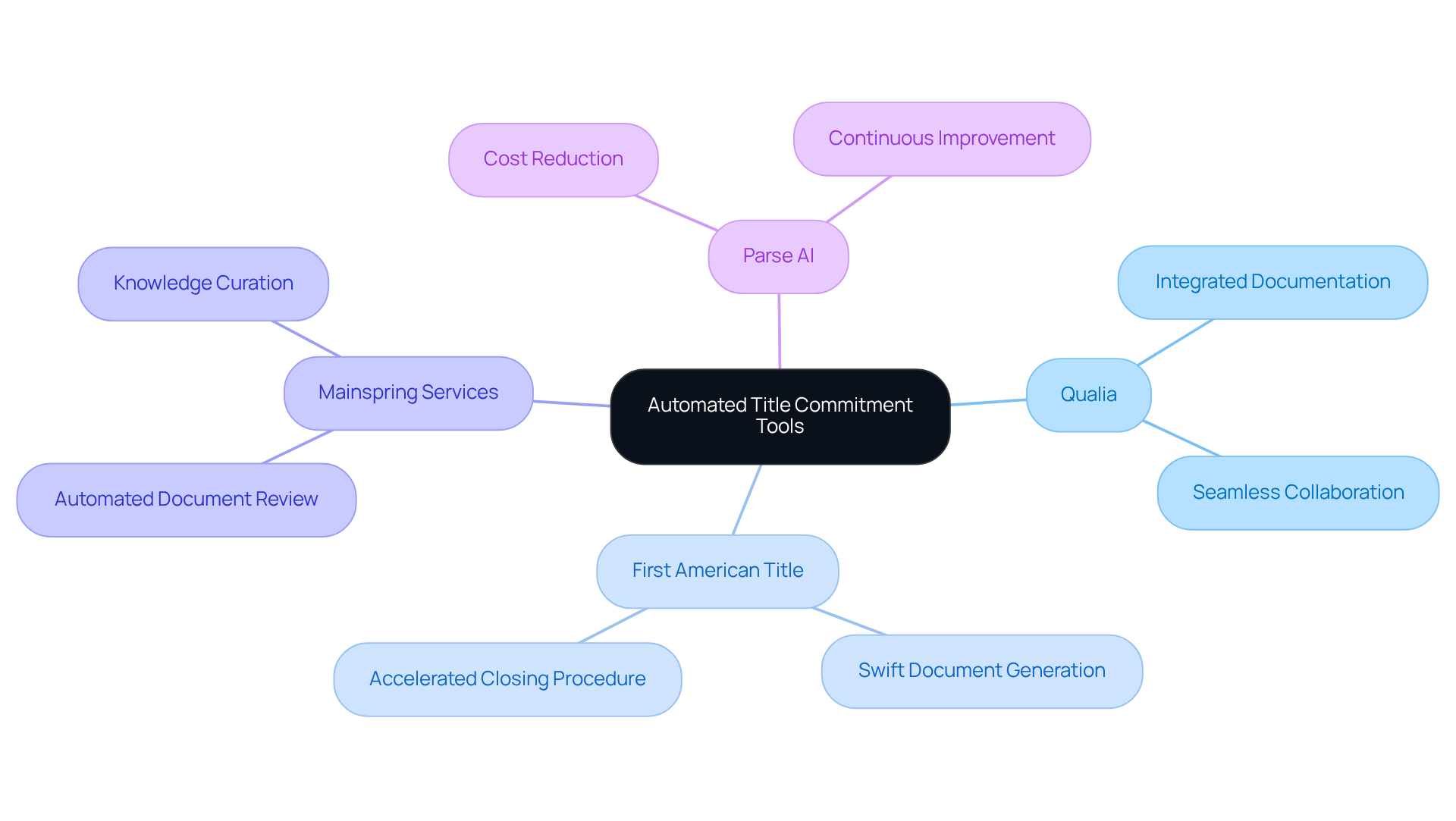
Benefits of Automated Title Commitment Tools
offer significant advantages that markedly enhance the effectiveness of research. A primary benefit is the reduction in processing time; by , these systems can produce agreements in a fraction of the time required by traditional methods. This efficiency not only but also allows professionals to handle a greater volume of transactions. Furthermore, the accuracy of automated systems , ensuring that obligations are reliable and compliant with legal standards. In addition, these tools often feature , which assist organizations in meeting regulatory requirements, ultimately .
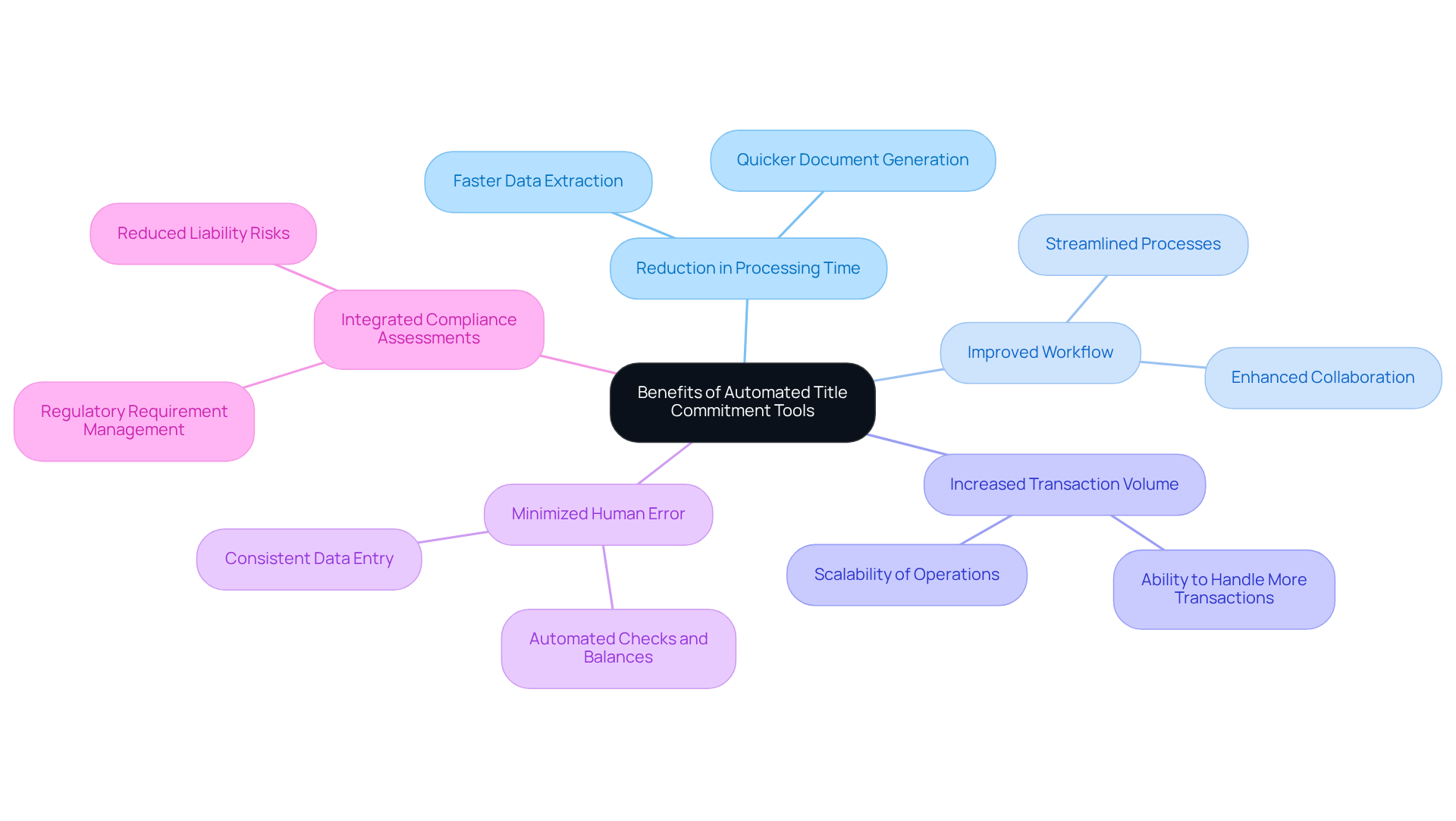
Drawbacks and Limitations of Each Tool
present significant advantages, yet they are not without limitations. A primary concern is the often required for users to fully leverage these resources' capabilities, which can initially impede productivity. Furthermore, reliance on technology introduces inherent risks; system downtime or can disrupt the entire research workflow, resulting in delays and inefficiencies.
Customization also plays a critical role; many resources lack the necessary flexibility to adapt to or specific compliance requirements, potentially diminishing their effectiveness. Moreover, while , it cannot entirely substitute for the that seasoned professionals provide, particularly in complex scenarios.
As industry specialists have noted, the combination of is essential to mitigate these challenges, ensuring that rather than complicate the research process.
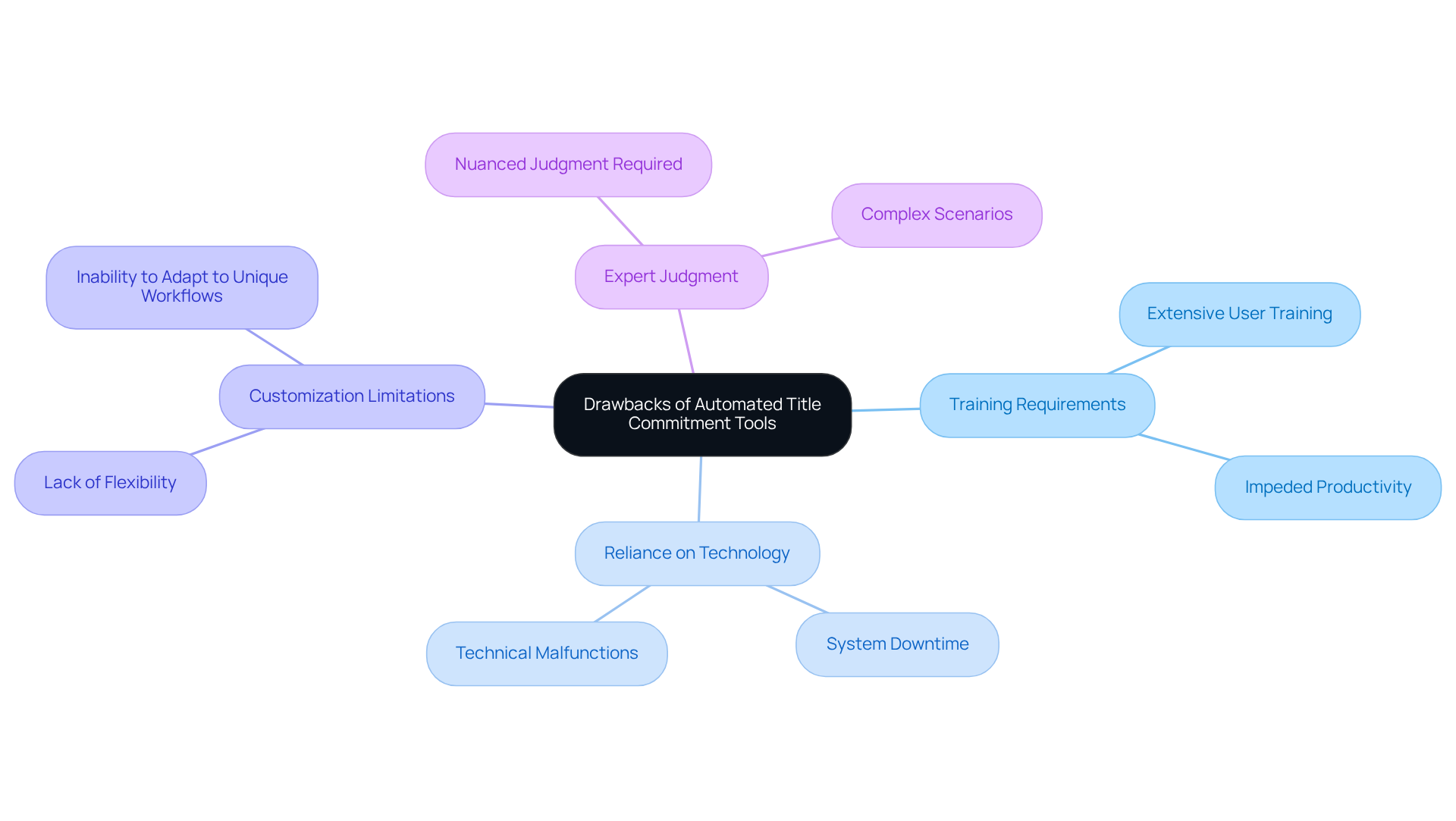
Choosing the Right Tool for Your Title Research Needs
Selecting the appropriate requires a thoughtful evaluation of several essential elements. Begin by assessing your organization's specific needs, such as transaction volume, the complexity of search processes, and the necessary integration with existing systems. For instance, organizations handling high transaction volumes may benefit from solutions that enhance processing, like Doma's machine intelligence platform, which can reduce closing times from over 50 days to under a week. Notably, 55% of surveyed title professionals identified , underscoring the .
Furthermore, evaluate the features of each resource in relation to your requirements. If rapid processing is vital, prioritize solutions that emphasize speed and efficiency. User experience is another key factor; resources that are can significantly shorten onboarding time, allowing teams to adapt swiftly. A recent survey revealed that , highlighting the specific benefits automation brings to research professionals in their workflows.
In addition, consider the level of customer support and the frequency of updates provided by the vendor. Continuous support can greatly impact the long-term success of the tool within your operations. As industry experts emphasize, 64% of surveyed professionals indicated their organizations , reinforcing the importance of digital strategies in decision-making. By carefully weighing these considerations, title research directors can leverage [automated title commitment generation tools](https://blog.parseai.co/comparing-data-enrichment-platforms-for-real-estate-firms) to make informed decisions that align with their operational goals and .
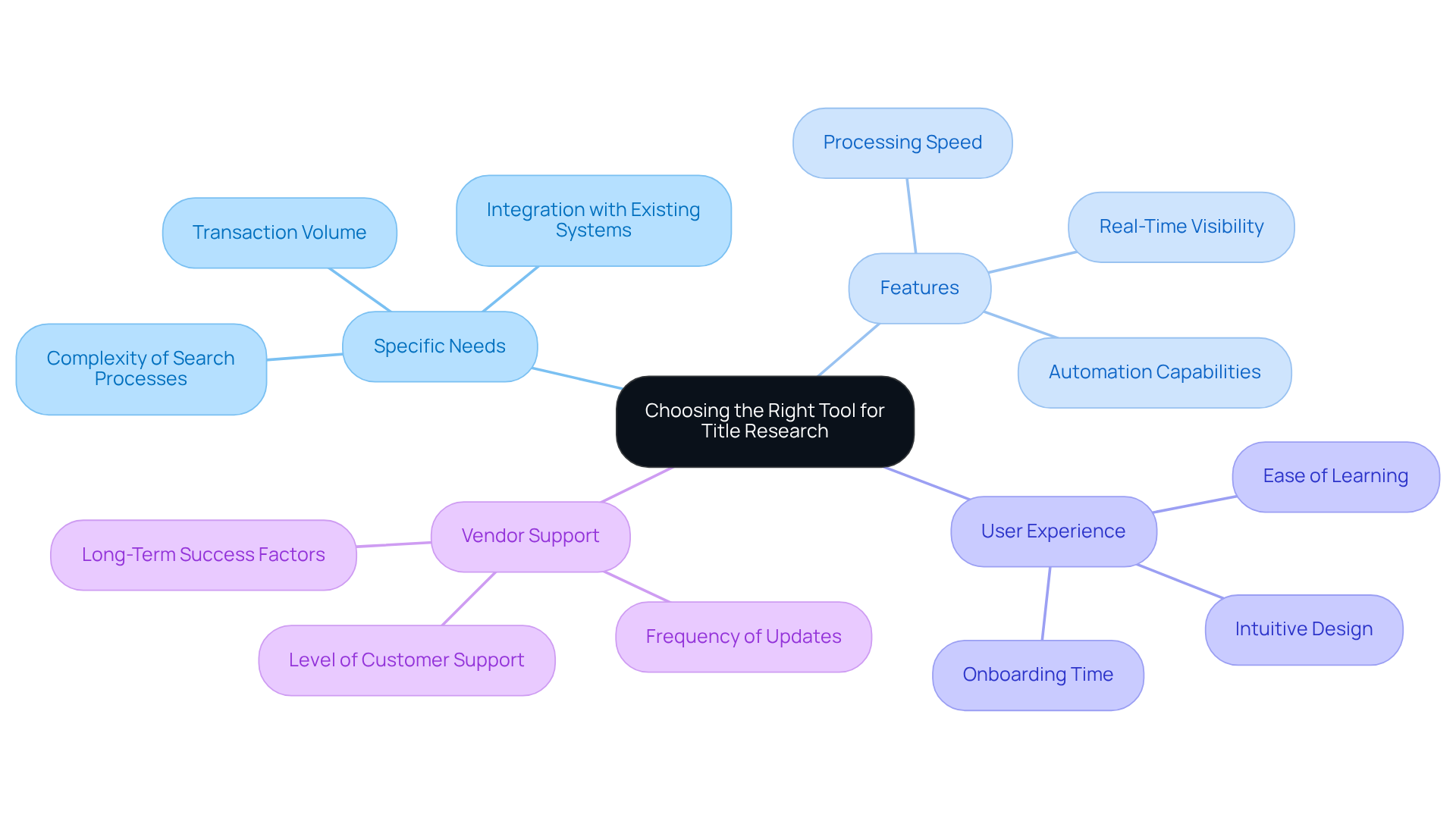
Conclusion
Automated title commitment generation tools are transforming the real estate industry by streamlining the research process and enhancing efficiency. These advanced systems utilize technologies such as machine learning and optical character recognition to automate data extraction and analysis, resulting in faster and more accurate document generation. As the demand for efficiency in property analysis continues to rise, the significance of these tools is paramount.
The article highlights key features of leading tools, including:
- Qualia
- First American Title's TitleSmart
- Mainspring Services' titleLOOK
These tools showcase their unique capabilities in improving user experience and operational productivity. The benefits of these automated systems—reduced processing times, enhanced accuracy, and integrated compliance assessments—further underscore their value in the title research landscape. However, it is crucial to recognize limitations, such as the need for extensive user training and potential system vulnerabilities, which can affect overall effectiveness.
In conclusion, adopting automated title commitment generation tools presents a significant opportunity for real estate professionals to enhance their workflows and improve client satisfaction. As the industry evolves, careful consideration of specific organizational needs and tool features will be essential in selecting the right solution. Embracing these technologies not only addresses current challenges but also positions professionals to thrive in a rapidly changing market, ultimately paving the way for a more efficient and responsive real estate environment.
Frequently Asked Questions
What are automated title commitment generation tools?
Automated title commitment generation tools are systems that enhance the effectiveness and precision of the property ownership research process by automating the extraction and analysis of data from document titles using technologies like machine learning and optical character recognition.
How do these tools benefit real estate professionals?
They reduce manual workloads, allow for quicker generation of agreements, and minimize errors, thereby improving overall efficiency in the document investigation workflow.
Can you provide examples of key players in the automated title commitment generation tools market?
Notable platforms include Qualia, First American Title's TitleSmart, and Mainspring Services' titleLOOK, each offering unique features tailored to real estate professionals' needs.
What challenges do automated title commitment generation tools address?
These tools address common challenges such as data inconsistency and extended processing times, making them increasingly vital in the evolving real estate industry.
What is the projected market growth for automated document generation systems?
The market share of automated document generation systems is expected to grow significantly by 2025, driven by the rising demand for efficiency in property analysis.
What are some key features of leading automated title commitment generation tools?
Qualia integrates property documentation with escrow processes, TitleSmart delivers documents in as few as 60 seconds, and titleLOOK offers advanced document review and knowledge curation features.
How does Parse AI enhance its offerings for users?
Parse AI collaborates with land service professionals to continually improve its offerings, ensuring users benefit from the latest innovations.
What advantages does Parse AI offer compared to traditional property investigation methods?
Parse AI provides substantial cost reductions, making it a more appealing option for real estate professionals.




